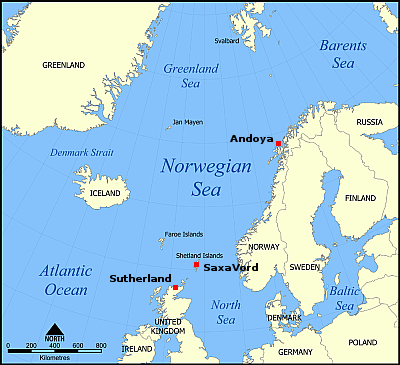German rocket startup signs deal with Norwegian spaceport

The German rocket startup Isar Aerospace has signed a deal to provide the Andoya spaceport in the north of Norway with a new flight tracking and safety system, to be used by all launches including Isar’s own Spectrum rocket.
The purpose of the autonomous flight tracking system is to precisely and reliably keeping track of the Spectrum launch vehicle’s position, speed and direction of travel as it ascends to orbit, which is important to guarantee Andøya Spaceport’s flight safety requirements. The objective is to further evaluate the use of the system in enabling automated flight termination functionality for launches by Andøya Spaceport’s ground system, autonomously triggering an abort of the mission if ever operational parameters of the launch vehicle are out of bounds.
This announcement today illustrates the rising competition between German rocket startups and European spaceports. Yesterday the Saxavord spaceport in Scotland and another German rocket startup, HyImpulse, announced their own launch deal. Today’s announcement is the response from Andoya and Isar.
Today’s announcement also increases the pressure in the UK’s Civil Aviation Authority (CAA) to get its regulatory act together. Andoya is positioning itself as a good alternative to the two new British spaceports in Scotland, as shown by the red dots on the map above, should red tape in the UK slow launches there.

The German rocket startup Isar Aerospace has signed a deal to provide the Andoya spaceport in the north of Norway with a new flight tracking and safety system, to be used by all launches including Isar’s own Spectrum rocket.
The purpose of the autonomous flight tracking system is to precisely and reliably keeping track of the Spectrum launch vehicle’s position, speed and direction of travel as it ascends to orbit, which is important to guarantee Andøya Spaceport’s flight safety requirements. The objective is to further evaluate the use of the system in enabling automated flight termination functionality for launches by Andøya Spaceport’s ground system, autonomously triggering an abort of the mission if ever operational parameters of the launch vehicle are out of bounds.
This announcement today illustrates the rising competition between German rocket startups and European spaceports. Yesterday the Saxavord spaceport in Scotland and another German rocket startup, HyImpulse, announced their own launch deal. Today’s announcement is the response from Andoya and Isar.
Today’s announcement also increases the pressure in the UK’s Civil Aviation Authority (CAA) to get its regulatory act together. Andoya is positioning itself as a good alternative to the two new British spaceports in Scotland, as shown by the red dots on the map above, should red tape in the UK slow launches there.
